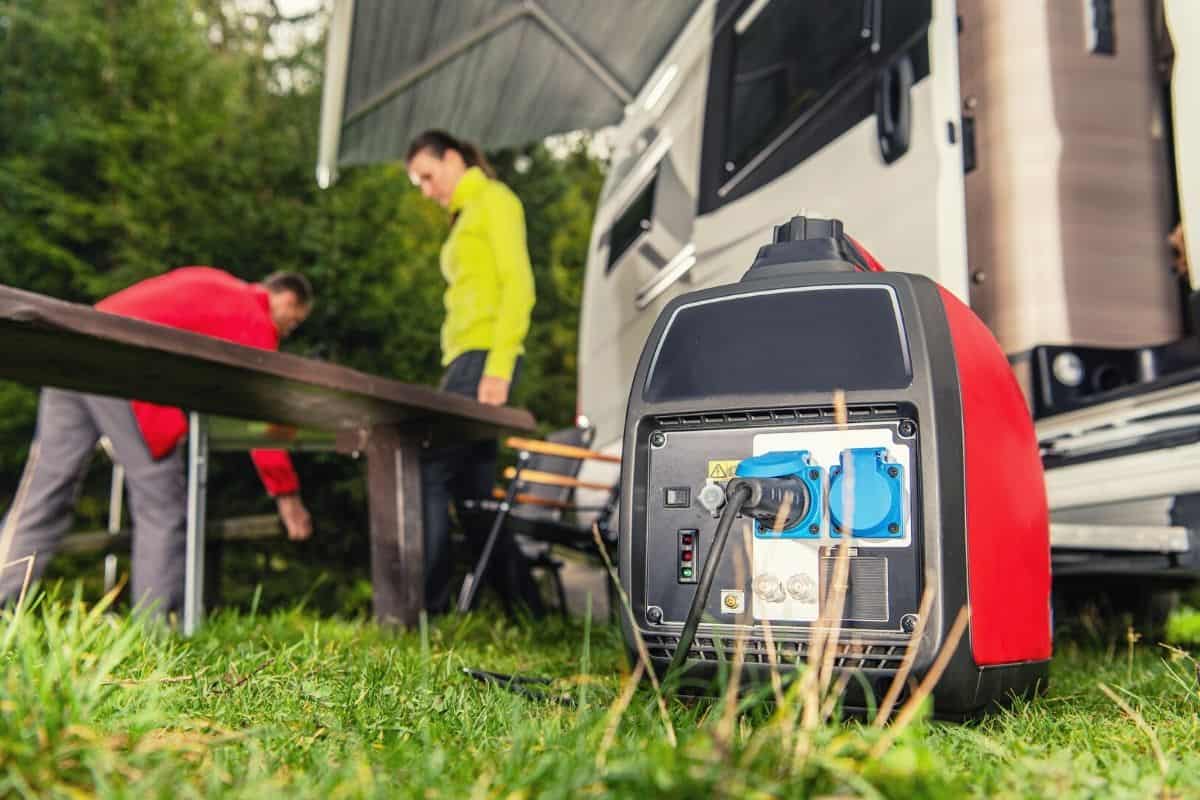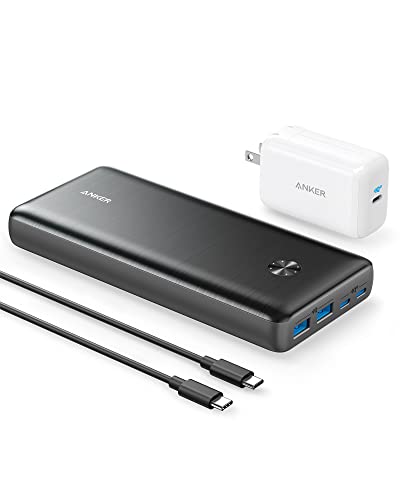While some campers swear off all tech while camping, there’s nothing wrong with wanting to enjoy the great outdoors without renouncing all of your favorite creature comforts. After all, there’s nothing better than curling up in your tent for a movie night after a long day of outdoorsy fun!
Enjoying electricity at your campsite isn’t all about fun and games, either. Having a power source at hand ensures important equipment like your smartphone or GPS devices will be charged in case of an emergency.
From solar power camping setups to traditional gas-powered generators, our guide will walk you through everything you need to know to electrify your start camping trip. We’ve added some general safety tips at the end too, so make sure you don’t miss them!
Table of Contents
1. Leisure Battery
Leisure batteries are a portable power solution frequently used to power campgrounds, RVs, and even homes. These batteries such as the Renogy Deep Cycle AGM are engineered to deliver consistent 12v power, perfect for charging anything from small tech gadgets to large camping appliances.
After a certain length of time, the voltage of a leisure battery will fall significantly. This means that the battery must be recharged from an external power source, such as a portable battery charger. If the leisure battery is left in its discharged state for too long, it may never regain its former condition.
The benefits of leisure batteries are that they provide a regular and uninterrupted source of power. Having a constant source of power such as this is especially important if you’re looking to power up your RV or motorhome.
However, while leisure batteries offer a consistent power source, that power comes at the cost of bulk and weight. This could cause problems for an RV where space is tight and weight load is already an issue.
Leisure batteries may also contain lead, so must be handled with care and respect at all times.
2. Electrical Hookups
One of the easiest ways to power your campsite is to bring along an electrical hookup cable and source your electricity directly from one of the electrical hook-ups provided at your campsite.
These outlets look similar to the regular power outlets you’d find in your own home or elsewhere on the electrical grid. To safely connect your appliances to the hook-up unit, you’ll need a special electric hook-up cable. Run this cable directly from the outlet to the appliances you wish to power.
Using the electrical hookup provided by a campground is one of the most inexpensive and convenient ways to power your campsite.
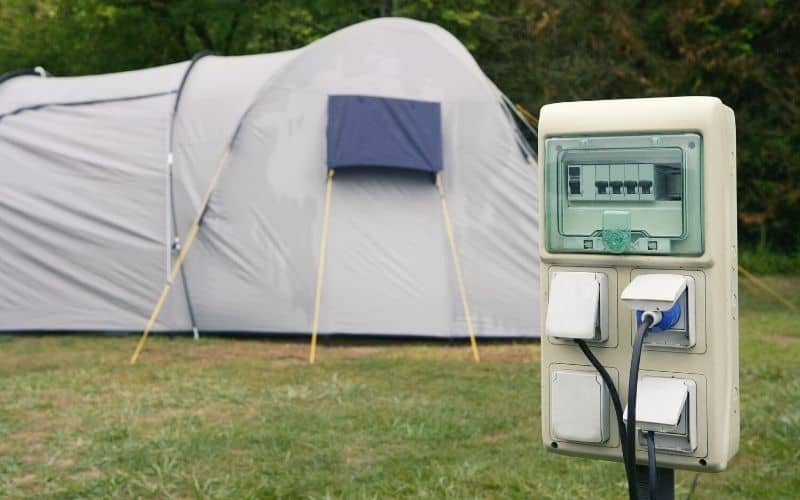
The downside? At home, you can use as many appliances as you’d like, however, a campsite socket is easy to overload. To avoid tripping the power supply for yourself (and your camp neighbors), you’ll probably have to stick to low-wattage appliances. You’ll also be restricted to campsites that offer electric hook-ups.
3. Gas Generators
One of the most popular methods of generating electricity at a campsite is through a gas-powered generator.
Gasoline generators burn gas to produce electricity. Although most of these generators run on regular gasoline, others can run on propane, natural gas, or diesel, which makes them a very versatile and reliable source of power.
But it isn’t all to the good…
Gas generators emit fumes and make a lot of noise. Many campsites have also outright banned gas generators or only allow them to be used during specific times. If your energy needs are low, therefore, we recommend you consider another type of electrical supply.
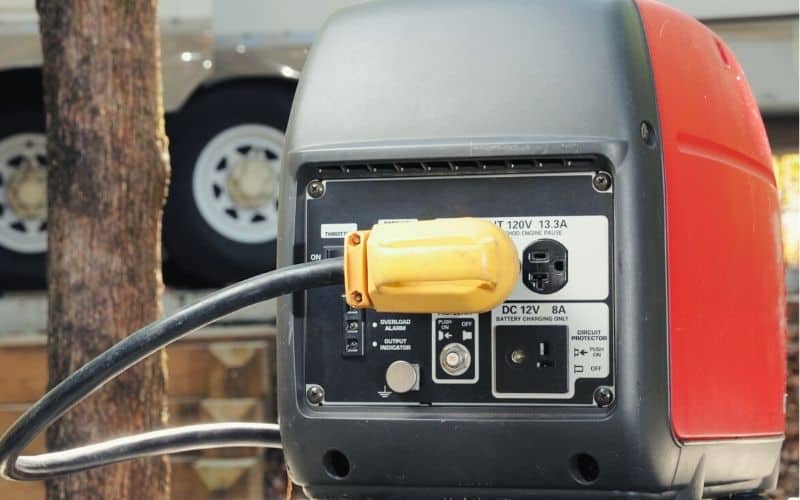
4. Thermoelectric Generator
Thermoelectric generators convert temperature differences and heat flow into a useful power source for camping.
For example, some thermoelectric generators take the form of a stove and convert the heat provided by burning coals into electricity. Others look like mini cooking pots and can generate electricity by boiling water over any heat source.
The main benefit of thermoelectric generators is that they produce clean energy without the fumes and noise of traditional gas-powered generators.
Their downsides are that they produce less power than traditional gas generators and require a relatively constant heat source to function. Because the energy output from thermoelectric generators is quite low, they’re only suitable for charging cell phones or a few small electronics.
5. Solar-Power Generator
Chunky solar-powered generators create power through portable solar panels and then store that energy in a smaller, portable power pack.
Unlike gas-powered generators, solar generators produce clean, emission-free energy. After the initial investment, your solar power generator will produce energy completely free of charge, and without any of the noise of other types of generators. Solar panels are also low-maintenance and can last for decades if cared for properly.
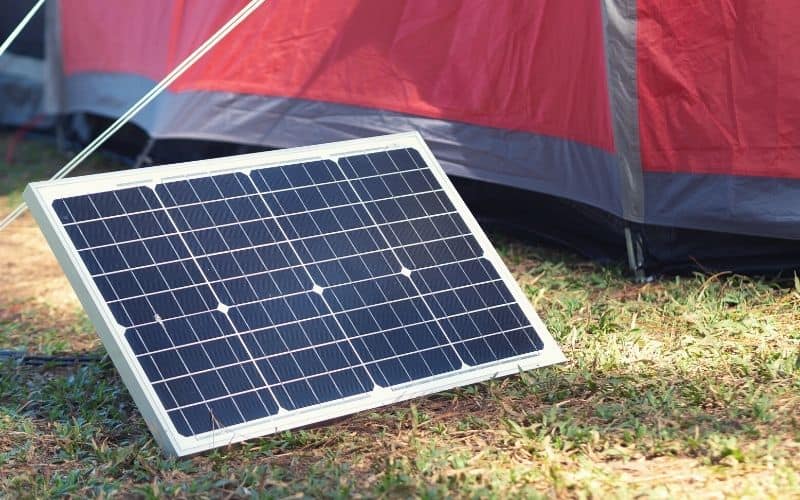
The bad news is that you’ll need a backup plan in case the sun doesn’t cooperate. Alternatively, you can buy a portable battery pack that includes an attachment and power inverter allowing you to charge the battery from your car, but this will add a hefty handful of $ to the overall cost. It’s also worth noting that even the best solar power generators have a relatively low output.
6. 12-Volt Car Battery
A convenient option for charging your camping gadgets and appliances is by using your car’s battery. With the help of a power inverter, you can transform the 12-volt electrical current produced by your car’s battery into the 120-volt energy needed for most camping gear.
The advantage of this means of powering up your electronics is that it costs very little and means you’ll always have access to reliable power from your car’s battery.
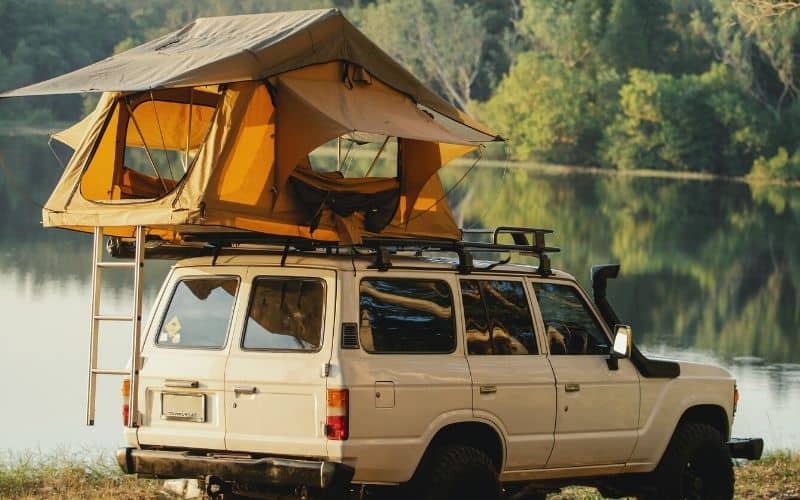
And the disadvantages? Powering up from your vehicle is all very well if you’re car camping, but if you want to head further afield, it ain’t going to be much use. 12-Volt car battery chargers are also extremely noisy and require a high-wattage inverter to run or charge energy-guzzling appliances like AC units, and high-wattage inverters will drain your battery faster.
7. Portable Battery Packs
Powerful, compact portable batteries offer a convenient solution to your campsite electricity needs.
Modern battery packs contain lithium-ion batteries that can store an electric charge (sometimes using solar power), allowing you to power up your gadgets at a later time. Battery packs come in a wide variety of sizes and storage capabilities, ranging from tiny portable chargers the size of a lipstick tube up to heavy, textbook-sized packs.
Portable chargers are ultra-lightweight and inexpensive, making them the perfect choice for campers looking for a power solution they can just throw in their packs.
All portable chargers, however, are not made equal, and their popularity has caused a surge of subpar chargers to flood the market. We love the Anker PowerCore III Elite 25600 for its high charging capacity, fast charging time, and 4 USB output ports. Make sure the portable battery pack you choose can meet the electricity demands of all your gear.
8. RV Battery Bank
If you find yourself routinely running out of juice in your RV, consider adding a battery bank before your next camping trip.
Although most RVs include a 12-volt battery that’s independent of the vehicle battery, they typically can’t store enough energy to power anything other than a few small, battery-powered appliances. One solution is to include an RV battery bank to up your camper’s energy storage capabilities.
An RV bank is simply several batteries connected together to store excess electricity. To keep your power bank functioning optimally, you’ll need to keep it charging as much as possible through either a generator, converter, or RV solar kit.
RV battery banks are a great way to ensure you don’t run out of power on multi-day or remote RV camping trips. Paired with an RV solar kit, you’ll be able to produce and store free electricity…
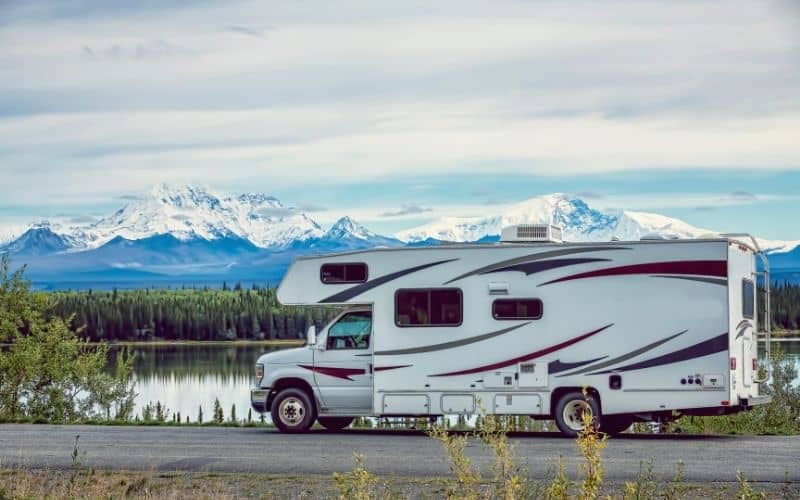
…after, that is, the costly initial investment. This aside, the only real downside to RV battery banks is their weight and bulk. They’ll take up a sizable chunk of space inside your “rig” and all that added weight is sure to result in you getting fewer miles to the gallon – something worth considering if you’re heading on long-distance road trips
9. Portable Pedal Generators
A portable pedal generator is a human-powered solution to your campsite electrical needs. A pedal generator produces electricity as you pedal with your legs or hands, as you would on a stationary bike.
Pedal generators are some of the most inexpensive generators out there and are also extremely lightweight and portable. They’re also useful to have on hand at campsites where noisy generators are not allowed. They also provide great cardio benefits…!
Although pedal generators are useful as a secondary source if your main power supply cuts out for any reason, their low output, the effort required to generate power, and their inability to store it mean they don’t make a good primary source of electricity.
10. Wind or Water Turbine
A wind or water turbine is another clean and environmentally-friendly way to enjoy electricity while camping. By harnessing the power of wind or water through a turbine, these small devices can produce enough electricity to power small gadgets like your smartphone.
A major selling point of wind and water turbines, apart from the clean energy they produce, is how compact and portable they are. Many models weigh in at less than 2 pounds, making them a convenient energy source for minimalist backpackers and campers.
As with a solar-powered generator, however, you’ll need certain weather conditions for your wind or water turbine to work. If you don’t bring along a secondary source of power, you might be left in the dark.
Happy Camping with Electricity!
As you can see, there is a wide range of options available to provide power at your campsite. To find the power source that fits your camping lifestyle, you’ll need to consider the price, the maximum power output, the portability of each type of electric supply, and your group’s electric consumption needs.
Got any burning questions about using electrical power at your campsite? Don’t hesitate to ask! And if you want to share this with any other tech-loving campers in your crew, feel free!
